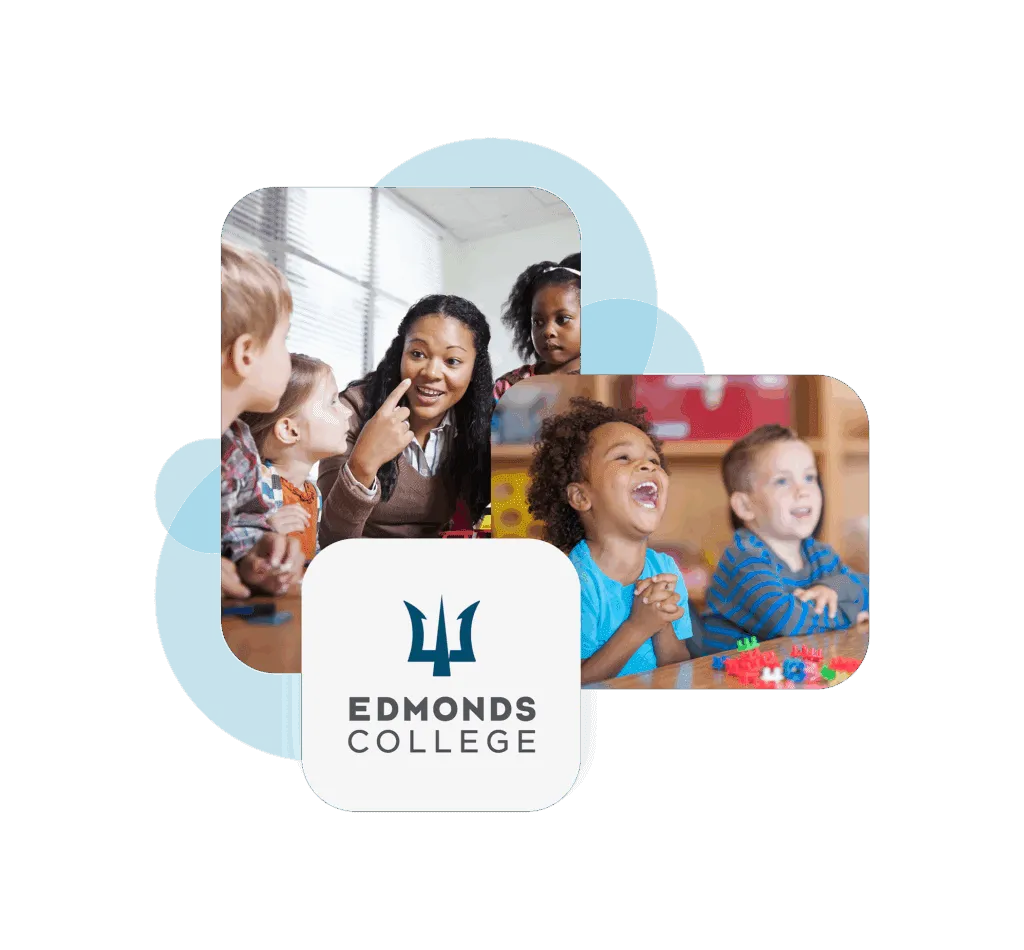Challenge
As the only Head Start program serving Snohomish County, Washington, Edmonds College had gifted and passionate teachers, but lacked the resources and structure to support them and to consistently champion the students they served. Newly appointed Executive Director Ginger Williams sought to:
Improve fidelity of implementation across the program, which was at only 7% in the fall of 2017-18.
Raise CLASS® assessment scores, which were just average at the time.
Provide “the very best” early childhood curriculum to improve child outcomes and get children excited about learning.
Solution
Williams partnered with Teaching Strategies to find the early childhood curriculum materials, support, and training her educators needed to improve child outcomes across her Head Start program.
 |
Edmonds College invested in The Creative Curriculum for all classrooms, boosting fidelity scores 63 points, from 7% to 70%. |
| Faculty were offered comprehensive professional development, including In-Program Sessions and coaching through Teaching Strategies’ Coach Membership program, all of which helped to significantly improve both fidelity and CLASS® assessment scores. | |
| Edmonds leveraged the GOLD formative assessment tool to not only establish priorities but also demonstrate improved child outcomes through child-, classroom-, and program-wide data. |
Results
Improving Fidelity with The Creative Curriculum
Fidelity is defined as “implementing a curriculum or intervention the way it was intended to be implemented by the developers.”1 Fidelity measures how accurately and consistently teachers deliver content, instructional strategies, and processes. By investing in The Creative Curriculum program-wide, as well as the accompanying professional development, Edmonds College transformed their fidelity score by 63 points, from 7% to 70% in just one year.
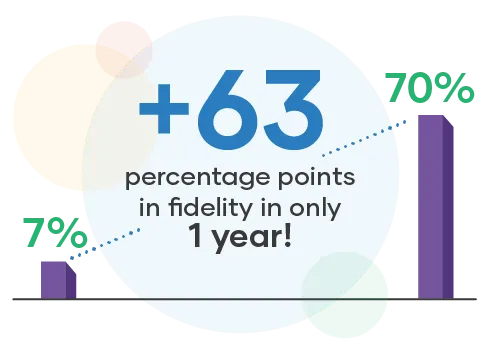
“Moving to fidelity wasn’t easy, but it was worth it,” said Lizz Bias, Regional Education Manager at Edmonds College.
Teachers saw the value of their efforts in working toward fidelity, as well. They felt it not only made teaching easier, but also made them more confident and less intimidated by CLASS® assessments. They knew that anyone could come into their class at any point and see high-quality interactions that inspired children to learn through discovery and play.
“The Creative Curriculum provides an intentional framework to create an environment that will expand and encourage children to go beyond what they know and can do now,” said Jen Rudolph, a preschool teacher at Edmonds College. “It’s an amazing curriculum that provides intentional learning opportunities for yourself, your team, and your children. You just need to embrace the tools.”
Fellow preschool teacher Debra Watson echoed her sentiment. “The Creative Curriculum gives you a map to teach effectively,” she said. “It provides the structure you need.”
Teaching to fidelity set educators, coaches, and leaders up for success by giving them best practices they could rely on and providing them with a common language and expectations.
This not only led to more successful, satisfied and engaged teachers, it delivered consistent results for the children and families they served.
Edmonds Teachers Perform Above CLASS® National Average
Many early childhood education programs use the CLASS® (Classroom Assessment Scoring System®) to measure and improve quality. CLASS® measures teacher-child interactions in three broad domains: emotional support, classroom organization, and instructional support.
After just one year of improving fidelity, Edmonds College scored above the national average across all CLASS® subscales, but most notably 11% above the national Head Start average for CLASS® in the Instructional Support subscale.
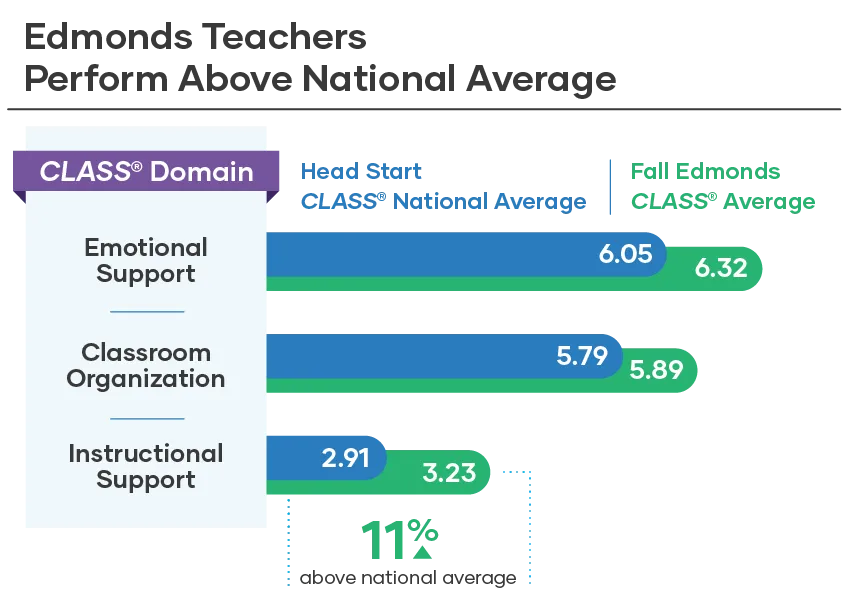
Their growth was even more impressive when new teachers were separated from returning teachers. The CLASS® scores of new teachers at Edmonds College matched the national Head Start average, whereas returning teachers who had benefited from Teaching Strategies’ early childhood curriculum materials, professional development, and coaching made significant jumps in all three CLASS® subscales.
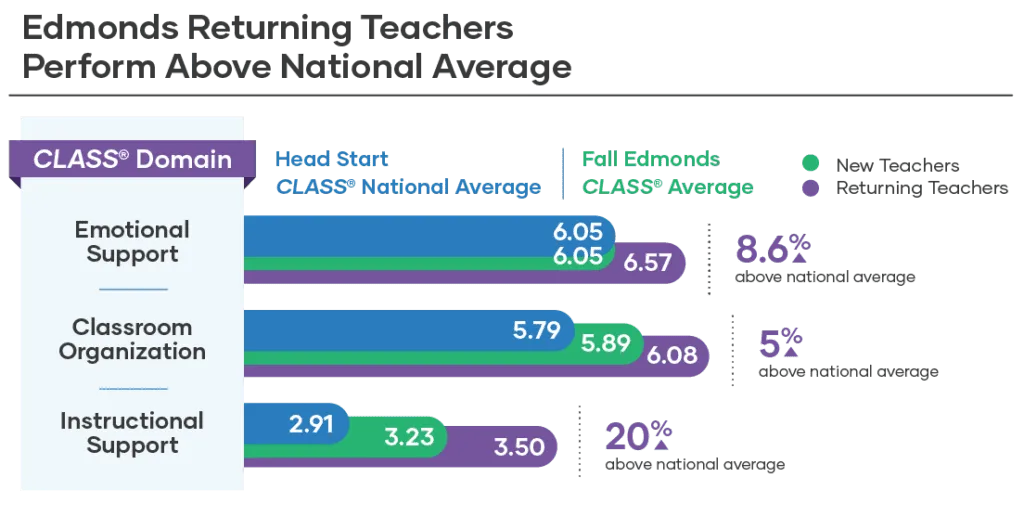
Dramatically Improved Child Outcomes
Edmonds’ intentional focus on boosting fidelity and CLASS® assessment scores had a dramatic positive impact on child outcomes. The percentage of children meeting or exceeding Washington State widely held expectations increased in every domain of the early childhood curriculum.

Teachers, from novice to master, felt empowered to engage students more deeply with intentional experiences supported by guidance and best practices from The Creative Curriculum.
Aaron Ross-Franco, former coach at Edmonds College Head Start, noted, “The Creative Curriculum provides a scalable way to support a novice teacher to grow into a masterful teacher.”
Consequently, children were more engaged—they not only learned more, but they engaged in fewer distracting behaviors, and there was less conflict.
Setting Teachers Up for Success
Following two years of intentional change, Edmonds College decreased turnover in addition to improving fidelity and child outcomes.
“Change is hard for everyone,” said Williams. “But offering quality practice-based coaching and setting clear expectations allowed us to effectively support our teachers from the start.”
“I saw a renewed excitement for teaching—I saw our teachers craving to learn more, our turnover rate went down. It’s been amazing to see the difference.”
Building on Their Success
Edmonds College has continued living out their mission of providing high-quality early childhood education by supporting teachers through regular professional development and practice-based coaching, maintaining and updating subscription classroom materials, and making The Creative Curriculum a pivotal part of new teachers’ orientation.
Since Edmonds College’s remarkable growth in the 2018–2019 school year, their commitment to quality has been reflected in high marks year after year in both CLASS® assessment scores and child outcomes as measured through GOLD formative assessments and Washington State standards.
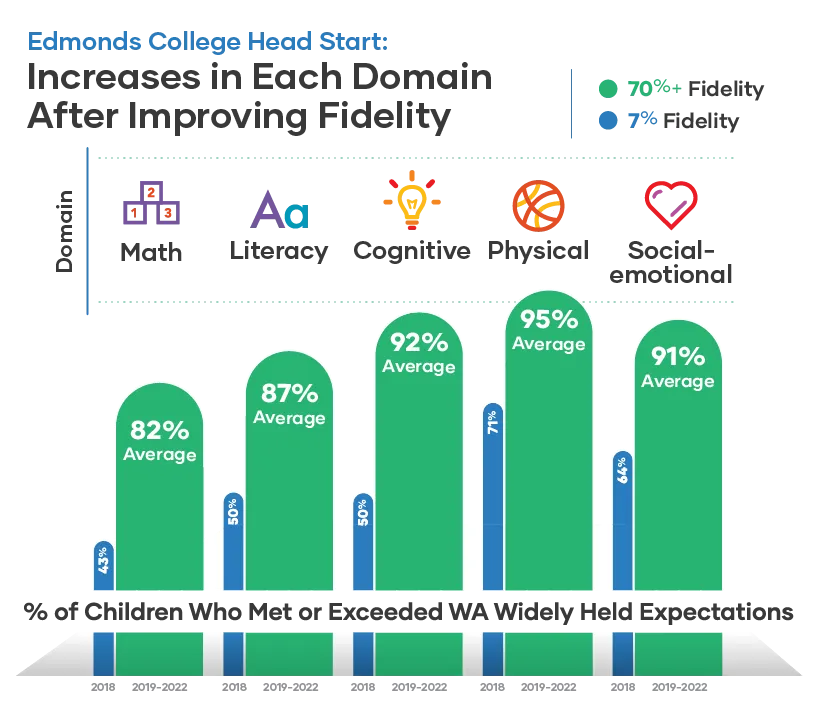
As they celebrate the wins their years of change have delivered, Edmonds College has its sights set on all that’s to come.
Together, they look forward to building on their success, empowering teachers, and continuing to provide high-quality early learning that nurtures and inspires the children they serve.
1. Mowbray, C. T., Holter, M. C., Teague, G. B., & Bybee, D. (2003). Fidelity criteria: Development, measurement, and validation. American Journal of Evaluation, 24(3), 315-340.
Edmonds College Head Start
Seattle, WA (Snohomish County)
• Founded in 1983
• Free, federally funded Head Start program
• 491 students
• 23 half-day classrooms in 9 locations
